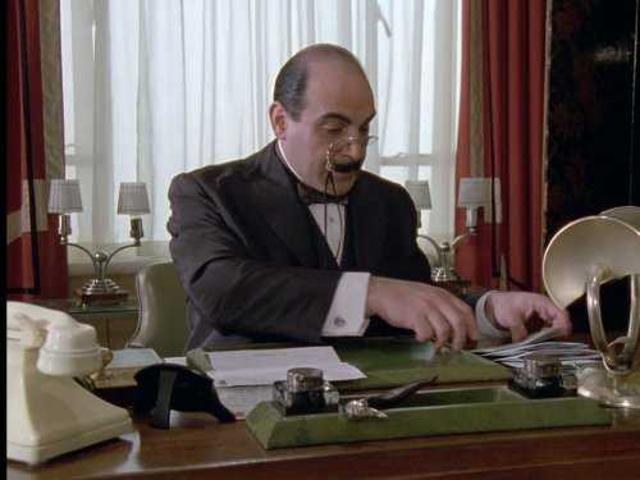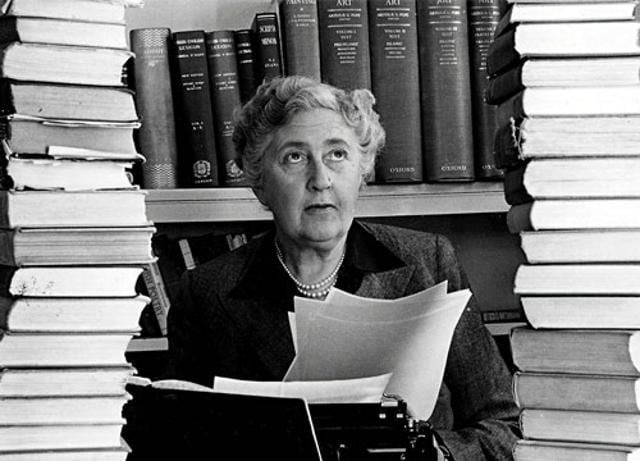What makes Agatha Christie and Hercule Poirot such all-time favourites? We find out
Agatha Christie continues to be the most popular choice for screen adaptations. As another film version of Murder on the Orient Express, starring Kenneth Branagh as the famous fictional detective Hercule Poirot, hits theatres this week, we look into the bestselling writer’s timeless appeal.
When it comes to detective fiction, few can match Agatha Christie’s spectacular success or her prolific oeuvre. In a career that lasted 55 years, Christie wrote 66 detective novels, 14 short story collections, including the world’s longest-running play (The Mousetrap) and created two of the most famous detectives of the genre. According to her estate, she is outsold only by the Bible and Shakespeare. Even four decades after her death on January 12, 1976, not only does she continue to be widely read, and taught in universities, she is also the most popular choice for screen adaptations.

Christie’s diminutive Belgian cop-turned private detective — just as famous for his glorious moustache as he is for his “little grey cells” — has been played on screen by numerous actors from Peter Ustinov to Albert Finney. While David Suchet, star of the long-running TV adaptation, is probably the most memorable on-screen Poirot, actor-director Kenneth Branagh gives the eccentric detective his own twist in his adaptation of Murder on the Orient Express, which released this week.
Interactive | Murder on the Orient Express and the timeless allure of Hercule Poirot
Part of Hercule Poirot’s charm, says professor Christel R Devadawson, who teaches Christie at the MPhil level in Delhi University, is the fact that he is an outsider “who comes within a space that he makes comfortable and familiar”. In the first Poirot novel, The Mysterious Affair at Styles (1920), he is a World War I refugee in England, a former Belgian police officer who left his country when the war broke out.
“From this outsider-insider consciousness, there comes a certain desire to render poetic justice, which may not always be the result of the criminal justice system but there is a certain human or emotional appropriateness about it. I think that characterises all of Poirot books, particularly Murder on the Orient Express,” says Devadawson, who also heads the department of English at DU.
Christie, who volunteered as a nurse during the Great War and was an apothecary’s assistant by the end of it, used her vast knowledge of poisons to fashion most of her plots. But all that effort never shows up as information dumps or hinders the narrative flow in her books. The readability of her novels, despite the complex plot twists and period settings, makes her very accessible to a general readership.
“There is an appearance of accessibility in Christie, not necessarily present in other crime writers of her time, which draws a great many people to her books,” says Devdawson. “She appeals to a certain kind of intelligence rather than a certain kind of disciplinary commitment. If you look at other kinds of crime writers, we have a much more in-your-face demonstration of knowledge – whether forensic, or medical or legal .”

Vaibhav Parel, assistant professor at Hansraj College, Delhi University, believes Christie’s appeal is a combination of multiple factors, including the fact that the murderers in her books are people like us.
“There’s the curiosity of finding out the identity of the killer combined with the thrill and shock of the revelation. If you look at the plots most of the murderers are pretty well-to-do, people who you would not expect to go around killing. That’s what is really interesting about Christie, she doesn’t make murder a class-based phenomenon,” says Parel who teaches The Murder of Roger Ackroyd at the undergraduate level to students of literature.
A certain emotional closeness, whether familial or professional, which defines the communities in Christie’s novels is also something Indian readers best connect to, feels Devadawson. “This appeal continues down the ages and I suspect is particularly true of all of us in India where many urban middle class families have this consciousness of either having grown up in a joint family or having extended family and friends on whom they can rely on in a crisis,” she says.
Jerry Pinto, author of Murder in Mahim (2017), a crime thriller set in Mumbai, says he is a Christie fan and re-reads her novels on a regular basis. “At the heart of Agatha Christie novels is this terrible crime: the termination of human life. But detective fiction always evades the moral implications of taking a life and turns it into something comfortable like a crossword puzzle,” he says.
The primal fear of death, says Pinto, is presented in such a manner that it becomes a pleasant pastime. “The French invented the murder mystery really but the British brought it to its height during the 20th century. Especially, those golden age ladies: Dorothy L. Sayers, Margery Allingham, Agatha Christie right up to PD James and Ruth Rendell are dealing with violence and sudden death and turning it into a civilised art form,” he says.
The reader of a cozy crime mystery is also secure in the knowledge that though a ghastly thing has happened, the criminal will eventually be caught and order restored.

But the Netflix generation, raised on a far more riveting diet of thrillers and dramas such as Sherlock, Game of Thrones, and so on, does not relate to the characters and settings in Christie’s books and would rather watch the film than read the book, says Parel.
“Excepting few students you do not find people who are interested in Christie. They may be interested in a murder mystery but not necessarily Christie,” says Parel. “The movies undoubtedly will draw crowds because people are always interested in seeing newer versions of a familiar story. Murder on the Orient Express has a period setting and a huge star cast with big names like Johnny Depp and Judi Dench. Moreover, everyone would want to see how Branagh plays Poirot,” he says.
Follow @htlifeandstyle for more




